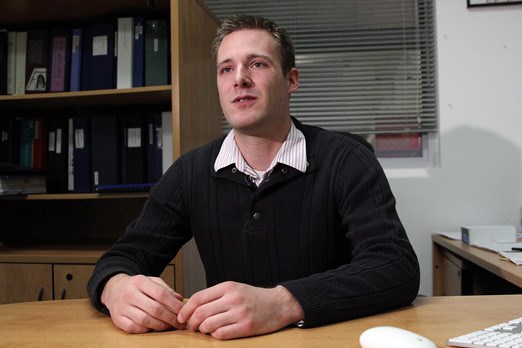The fight for a say in tuition hikes at Lakehead University could land the school in front of a judicial review.
Lakehead University Student Union president Michael Snoddon on Thursday confirmed he would be filing an application for such a review with the province, saying the school’s board of governors have misinterpreted changes to the university’s conflict of interest bylaws.
The board of governors decision means three student representatives board representatives have been denied the ability to have input as an eight per cent tuition hike was debated since the changes were put in place on Jan. 27.
Snoddon said it’s a slippery slope, and tuition is just the start. He’s worried the school could expand their interpretation of the bylaw changes to include a raft of other issues that affect students, including a possible transfer of land to Thunder Bay Country Club to build a driving range.
“We’re going to be asking the courts to weigh in on this interpretation and find a proper way to move forward,” said Snoddon, who spent much of Thursday fielding media calls from across the country once their plan of attack was made public.
Snoddon said the school’s response was immediate and indicated no willingness to negotiate.
“The response from the university was ‘Go away,” said Snoddon, who then sent a second letter to the board of governors, noting Lakehead would be the only university in Canada that wouldn’t allow students representatives to have a say when tuition increases were on the table.
“Without students there would not be a university. We contribute 48 per cent of the university’s operating budget, by our tuition fees. So we are the major stakeholder in the university,” Snoddon said, calling it a structural conflict.
“Every single student is affected by these changes. It isn’t just these students. And these students are representatives. They are duly elected by the student body or appointed by the Student Union. Looking at the structural conflict, it’s unique.”
According to Snoddon, tuition fees at Lakehead have risen 71 per cent since 2006. An undergraduate student in 2011-12 paid between $5,250 to $6,264 in tuition costs, not including ancillary fees that boosted the amount by as much as an additional $939.
Board of governors chairman Colin Bruce said the university listens to student input on a variety of subjects, ranging from class sizes to quality of life, and including tuition feels.
“What we can’t have is students voting on tuition fees, and that is really what the nub of the problem is, although it’s been characterized as broader than that,” Bruce said.
“Clearly conflict of interest laws will tell you, if you have a financial interest in a position, you should not vote on that matter. It’s a clear conflict.”
Bruce said the new conflict of interest rules may be new to the school, and to the country for that matter, but it’s based on sound legal backing.
“And it’s not directed at students. It’s directed at every member of the board of governors, so conflict can be equally applied to any member of the board, not just students,” said Bruce, who added the decision came out of a comprehensive review of the board of governors, including their bylaws.
“It certainly wasn’t something that was singled out to be particularly punitive or of particular interest. It was one part of a very large review.”
Bruce said students are simply exercising their rights to challenge and he understands why they are not happy.
But it doesn’t sway his opinion, he said, acknowledging Lakehead University may be a little ahead of the curve in Canada, but likely not for long.
“We’re being watched with interest because we are doing things that are considered avant garde and very positive and productive in making members of the board feeling more empowered, feeling more engaged and feel like they’re adding value to the university,” Bruce said.
“Are we a little different? Yes we are, but that’s not to say we’ve done something irrational. We’ve done something exciting and we’ve asked every member of the board to be subject to the same rules, to the same ethical standards.”
Snoddon, however, feels the exact opposite.
“We wouldn’t have moved forward with a legal case if we didn’t feel we were going to win this. This is the first baby step,” Snoddon said, threatening further lawsuits if the judicial review ruled against the student union.
The board of governors vote on the tuition increase is scheduled for Friday.
